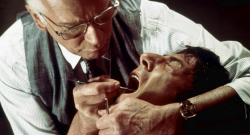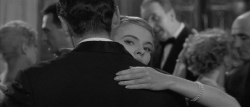Reviews
William Wyler
USA, 1933
Credits
Review by Veronika Ferdman
Posted on 21 April 2012
Source 35mm print
Categories TCM Classic Film Festival 2012
The events of William Wyler’s Counsellor at Law take place exclusively within the space of a law office headed by John Barrymore. And there are few actors who possess the intrinsic nobility and grace of Barrymore, qualities that radiate from him and which he uses to make every indignity trespassed against him seem all the more unjust and tragic. The film is a series of ticks and twitches: doors constantly opening and closing, phones incessantly ringing and being answered, people striding in haste from one room to another to deliver some important piece of information or to flirt with a co-worker, and chocolates being gulped down in furtive delight by the employees of this establishment. Wyler gives everyone in the office—from the secretary to the mail boy to the never-ending stream of people coming to seek help from Barrymore—their due moments of punctuated presence, penetrating through the surface of this world’s bubble to present a prismatic view of what it looks like from within.
And at the heart of this world is Barrymore, a man who immigrated to the United States at a young age and grew up in a poor Jewish district of New York, going on to make his own fortune. There are two things he loves in life: his work and his spoiled and selfish wife, played by an elegant and icy Doris Kenyon. In one scene he gives money out of his own pocket to a mother from the neighborhood in which he grew up whose son got beat up by the police for making communist speeches. He is tragically generous, up against a world that’s immoral and likes to gut the good. His defense of a man he knew to be guilty but trusted would straighten out ten years ago—a case that called for contriving a phony alibi—comes back to bite him, and he faces possible disbarment. And so we watch him stumble and fear, maneuvering out of the situation while trying to cleave to his wife who spins away from him like a razor-edged whirligig.
But, in this film, in 1933, Wyler still has faith in humanity. He would go on to tell a similar story of a man with a moral core pressed up against the blackness of the world in 1951 with Detective Story, set entirely in a police station. It’s interesting to see how an artist’s worldview develops, how the line between optimism and pessimism (or nihilism) for humanity is negotiated from film to film. In 1933 Wyler saw the world as something that could still be salvaged. In 1951 he didn’t.
More TCM Classic Film Festival 2012
-

Girl Shy
1924 -

Cry Danger
1951 -

Marathon Man
1976 -

Counsellor at Law
1933 -

Black Sunday
1977 -

Call Her Savage
1932 -

Bonjour Tristesse
1958 -

The Women
1939
We don’t do comments anymore, but you may contact us here or find us on Twitter or Facebook.



